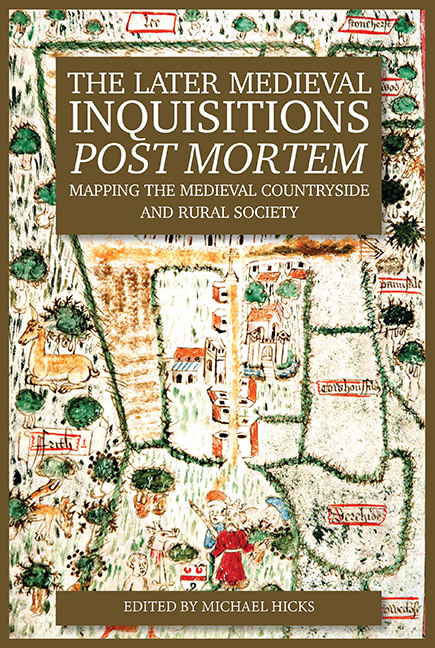Book contents
- Frontmatter
- Contents
- List of Illustrations
- List of Contributors
- Glossary
- List of Abbreviations
- 1 Introduction
- 2 Records of an Imperial Administration? Inquisitions Post Mortem in Scotland and Calais
- 3 Inquisitions Post Mortem in Medieval Ireland
- 4 The Court of the Honour of Clare, 1308–60: Feudal Incidents and Inquisitions
- 5 Landscape, Farming and Society in an English Region: The Inquisitions Post Mortem for the West Midlands, 1250–1509
- 6 Beyond the Dots: Mapping Meaning in the Later Medieval Landscape
- 7 Fairs and Markets in the Inquisitions Post Mortem
- 8 The Structure of the Milling Industry 1427–37
- 9 Proofs of Age 1246 to 1430: Their Nature, Veracity and Use as Sources
- 10 What Went On in the Medieval Parish Church, 1377–1447, with Particular Reference to Churching
- 11 Retainers, Monks and Wine: Three Insights into Everyday Life
- 12 The Administration and Efficiency of the Inquisitions Post Mortem Process: A Case Study of Northumberland
- 13 Late Medieval Land Disputes and the Manipulation of the Inquisitions Post Mortem
- Index
4 - The Court of the Honour of Clare, 1308–60: Feudal Incidents and Inquisitions
Published online by Cambridge University Press: 26 May 2021
- Frontmatter
- Contents
- List of Illustrations
- List of Contributors
- Glossary
- List of Abbreviations
- 1 Introduction
- 2 Records of an Imperial Administration? Inquisitions Post Mortem in Scotland and Calais
- 3 Inquisitions Post Mortem in Medieval Ireland
- 4 The Court of the Honour of Clare, 1308–60: Feudal Incidents and Inquisitions
- 5 Landscape, Farming and Society in an English Region: The Inquisitions Post Mortem for the West Midlands, 1250–1509
- 6 Beyond the Dots: Mapping Meaning in the Later Medieval Landscape
- 7 Fairs and Markets in the Inquisitions Post Mortem
- 8 The Structure of the Milling Industry 1427–37
- 9 Proofs of Age 1246 to 1430: Their Nature, Veracity and Use as Sources
- 10 What Went On in the Medieval Parish Church, 1377–1447, with Particular Reference to Churching
- 11 Retainers, Monks and Wine: Three Insights into Everyday Life
- 12 The Administration and Efficiency of the Inquisitions Post Mortem Process: A Case Study of Northumberland
- 13 Late Medieval Land Disputes and the Manipulation of the Inquisitions Post Mortem
- Index
Summary
Feudal relationships between lords and vassals in the honour court are often shrouded in obscurity, as few honour court rolls survive before the fourteenth century. By then knight service by vassals in the royal army and as castleguard was in terminal decline, and the relationship between lord and vassal was primarily financial. Yet the tenurial relationship remained important. The vassal was still expected to perform homage and swear fealty to his lord and to attend the honour court. On succession to a fee, the lord had the right to exact relief from the heir; if the heir was under the age of 21, the lord had the right to his wardship and marriage. For heiresses the age of majority was 14 (if married) and 16 (if unmarried). The lord was also entitled to collect financial aids. These seigniorial rights were not finally abolished until after the Restoration of Charles II.
The principal lands of the honour of Clare lay in Norfolk, Suffolk and Essex, with outlying holdings in adjacent counties; the term honour here denotes the demesne manors and tenanted land held by the lord and centred on Clare, Suffolk. The honour of Clare was formed after the Norman Conquest when the lands of Wihtgar and Phin the Dane were granted by William the Conqueror to Richard son of Count Gilbert of Brionne, the founder of the Clare baronial family, after the rebellion of the earls of 1075 which Richard, as one of the justiciars of the realm in the king's absence, helped to suppress. The lands in Norfolk were added in the early twelfth century and in 1189, when the Clares gained half of the lands of Walter Giffard, earl of Buckingham. The honour always remained an important part of the Clare estates, although the Clares’ power was greatly augmented in 1217 when they inherited the more extensive lands of the honour of Gloucester in west and south-west England and in south Wales. As earls of Gloucester and Hertford, the Clare family were leaders of the English baronage in the thirteenth century. Gilbert, the last Clare earl of Gloucester, was killed at the battle of Bannockburn in 1314. His only son had been born and died two years earlier.
- Type
- Chapter
- Information
- The Later Medieval Inquisitions Post MortemMapping the Medieval Countryside and Rural Society, pp. 49 - 58Publisher: Boydell & BrewerPrint publication year: 2016



